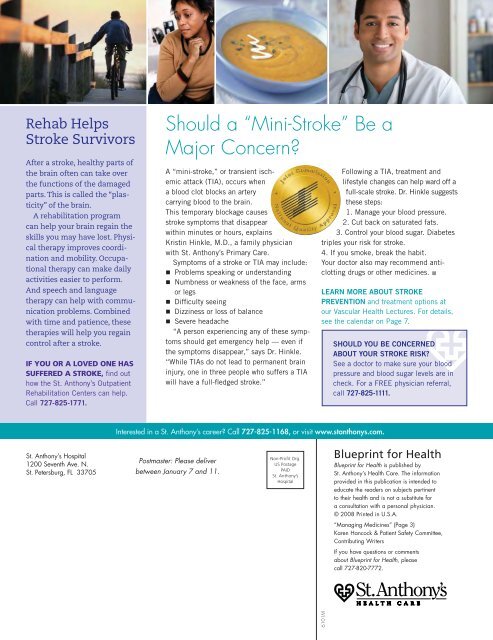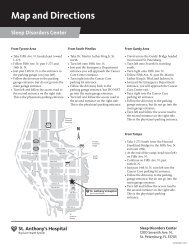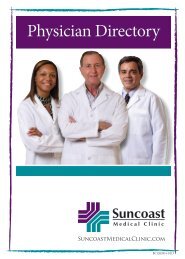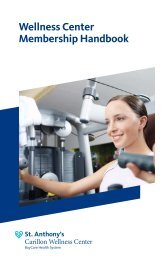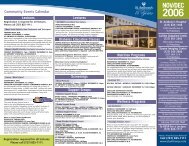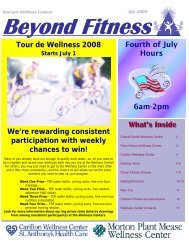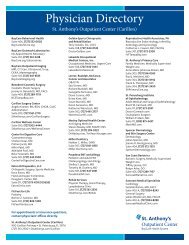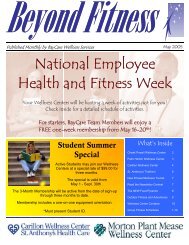2008 winter - Blueprint for Health magazine - St. Anthony's Hospital
2008 winter - Blueprint for Health magazine - St. Anthony's Hospital
2008 winter - Blueprint for Health magazine - St. Anthony's Hospital
You also want an ePaper? Increase the reach of your titles
YUMPU automatically turns print PDFs into web optimized ePapers that Google loves.
Rehab Helps<br />
<strong>St</strong>roke Survivors<br />
After a stroke, healthy parts of<br />
the brain often can take over<br />
the functions of the damaged<br />
parts. This is called the “plasticity”<br />
of the brain.<br />
A rehabilitation program<br />
can help your brain regain the<br />
skills you may have lost. Physical<br />
therapy improves coordination<br />
and mobility. Occupational<br />
therapy can make daily<br />
activities easier to per<strong>for</strong>m.<br />
And speech and language<br />
therapy can help with communication<br />
problems. Combined<br />
with time and patience, these<br />
therapies will help you regain<br />
control after a stroke.<br />
IF YOU OR A LOVED ONE HAS<br />
SUFFERED A STROKE, find out<br />
how the <strong>St</strong>. Anthony’s Outpatient<br />
Rehabilitation Centers can help.<br />
Call 727-825-1771.<br />
Should a “Mini-<strong>St</strong>roke” Be a<br />
Major Concern?<br />
A “mini-stroke,” or transient ischemic<br />
attack (TIA), occurs when<br />
a blood clot blocks an artery<br />
carrying blo od to the brain.<br />
This temporary blockage causes<br />
stroke symptoms that disappear<br />
within minutes or hours, explains<br />
Kristin Hinkle, M.D., a family physician<br />
with <strong>St</strong>. Anthony’s Primary Care.<br />
Symptoms of a stroke or TIA may include:<br />
• Problems speaking or understanding<br />
• Numbness or weakness of the face, arms<br />
or legs<br />
• Difficulty seeing<br />
• Dizziness or loss of balance<br />
• Severe headache<br />
“A person experiencing any of these symptoms<br />
should get emergency help — even if<br />
the symptoms disappear,” says Dr. Hinkle.<br />
“While TIAs do not lead to permanent brain<br />
injury, one in three people who suffers a TIA<br />
will have a full-fledged stroke.”<br />
Following a TIA, treatment and<br />
lifestyle changes can help ward off a<br />
full-scale stroke. Dr. Hinkle suggests<br />
these steps:<br />
1. Manage your blood pressure.<br />
2. Cut back on saturated fats.<br />
3. Control your blood sugar. Diabetes<br />
triples your risk <strong>for</strong> stroke.<br />
4. If you smoke, break the habit.<br />
Your doctor also may recommend anticlotting<br />
drugs or other medicines. •<br />
LEARN MORE ABOUT STROKE<br />
PREVENTION and treatment options at<br />
our Vascular <strong>Health</strong> Lectures. For details,<br />
see the calendar on Page 7.<br />
SHOULD YOU BE CONCERNED<br />
ABOUT YOUR STROKE RISK?<br />
See a doctor to make sure your blood<br />
pressure and blood sugar levels are in<br />
check. For a FREE physician referral,<br />
call 727-825-1111.<br />
Interested in a <strong>St</strong>. Anthony’s career? Call 727-825-1168, or visit www.stanthonys.com.<br />
<strong>St</strong>. Anthony’s <strong>Hospital</strong><br />
1200 Seventh Ave. N.<br />
<strong>St</strong>. Petersburg, FL 33705<br />
Postmaster: Please deliver<br />
between January 7 and 11.<br />
Non-Profit Org.<br />
US Postage<br />
PAID<br />
<strong>St</strong>. Anthony’s<br />
<strong>Hospital</strong><br />
<strong>Blueprint</strong> <strong>for</strong> <strong>Health</strong><br />
<strong>Blueprint</strong> <strong>for</strong> <strong>Health</strong> is published by<br />
<strong>St</strong>. Anthony’s <strong>Health</strong> Care. The in<strong>for</strong>mation<br />
provided in this publication is intended to<br />
educate the readers on subjects pertinent<br />
to their health and is not a substitute <strong>for</strong><br />
a consultation with a personal physician.<br />
© <strong>2008</strong> Printed in U.S.A.<br />
“Managing Medicines” (Page 3)<br />
Karen Hancock & Patient Safety Committee,<br />
Contributing Writers<br />
If you have questions or comments<br />
about <strong>Blueprint</strong> <strong>for</strong> <strong>Health</strong>, please<br />
call 727-820-7772.<br />
6101M


